Baseball History Comes Alive Now Ranked #2 by Feedspot Among All Internet Baseball History Websites and Blogs!
Guest Submissions from Our Readers Always Welcome!
Scroll Down to Read Today’s Essay
Subscribe to Baseball History Comes Alive for automatic updates (sign-up block found in right side-bar)
As a Free Bonus for subscribing, you’ll get instant access to my two Special Reports: Memorable World Series Moments and Gary’s Handy Dandy World Series Reference Guide!
Branch Rickey Photo Gallery
Click on any image below to see photos in full size and to start Photo Gallery:
Let’s Remember the Great Branch Rickey!
“Ethnic prejudice has no place in sports, and baseball must recognize that truth if it is to maintain stature as a national game.” -Branch Rickey
It was a sad day for baseball 56 years ago yesterday…
On November 13, 1965, Branch Rickey suffered a heart attack, eleven days short of his 84th birthday. Mr. Rickey fell over the podium during his induction speech into the Missouri Sports Hall of Fame. “The Mahatama,” who was responsible for breaking baseball’s odious color barrier with the signing of Jackie Robinson, passed away three weeks later on December 5, 1965. Thus at once, baseball lost its greatest innovator and civil rights pioneer; and, quite frankly, the world lost one of its truly great men.
It started back in 1903…
Branch Rickey, manager of the Ohio Wesleyan University baseball team, took his team to South Bend to play Notre Dame. When the team arrived at the old Oliver Hotel, the hotel manager said, “I have rooms for all of you — except for him” — and he pointed to the team’s catcher, Charley Thomas, who was black.
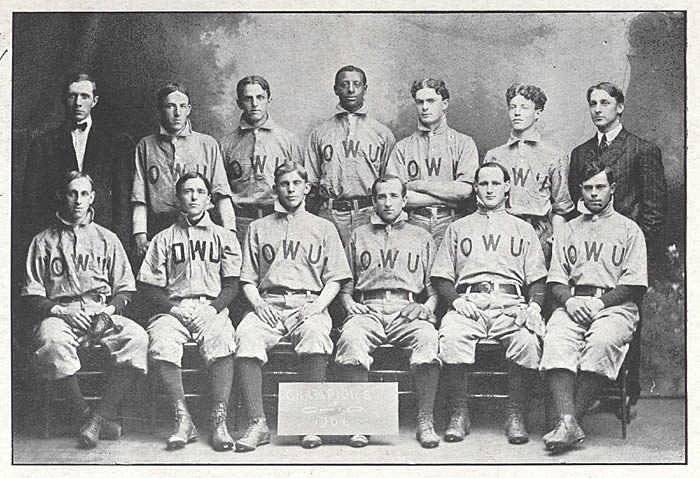
“Why don’t you have a room for him?” Rickey asked. “Because our policy is whites only,” the manager replied. “I’d like to have Charley stay in my room,” said Rickey. “Can you bring in a cot?” After long deliberations, the innkeeper relented. Later, when Rickey got to his room, Charlie Thomas was sitting on a chair sobbing. Rickey recalled later:
Charlie was pulling frantically at his hands, pulling at his hands. He looked at me and said, ‘It’s my skin. If I could just tear it off, I’d be like everybody else. It’s my skin, it’s my skin, Mr. Rickey!’
That heartbreaking scene stayed with Rickey for the rest of his life. It became seared into his soul. He had witnessed a severe moral injustice, and he would never forget it.
Fast forward, It’s now 1945…
In late August, Branch Rickey had a long conversation with Jackie Robinson, wanting to know if he would be able to take the racial abuse he was sure to be subjected to without fighting back. “Are you looking for a Negro who is afraid to fight back?” Jackie asked. Rickey replied, “I’m looking for someone with guts enough not to fight back.”
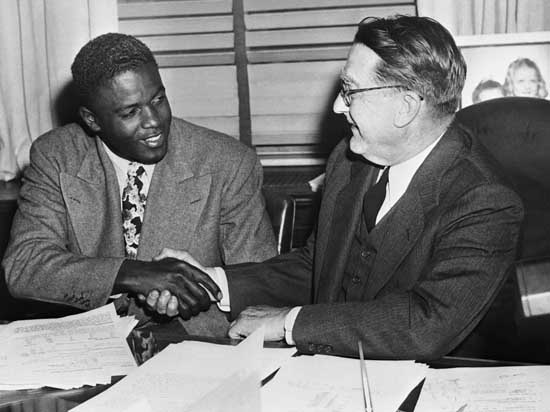
Two years later, the racial barrier was finally broken, thanks to these two heroic men. Jackie won the first-ever Rookie of the Year Award, batting .297, scoring 125 runs with 12 homers, and stole 29 bases, helping the Brooklyn Dodgers win the 1947 National League pennant. Jackie later said of Branch Rickey:
The more I learned about Branch Rickey, the more pleased I was that I was playing ball for him. I wanted to show him I was capable of handling any situation into which he might drop me. I had never known a man like him before.
As wonderful as the Jackie Robinson accomplishment was, it did not come without its bittersweet side. Deep down, everyone – players, owners, fans – knew that it sounded the death knell for the Negro Leagues, a beloved institution that was a huge part of the African-American experience in America, and had meant so much to so many. And, as anticipated, the Negro Leagues were gone forever within a few years.
Quite a Resume…
In addition to the signing of Robinson, Branch Rickey was the general manager of eight pennant winners and four World Series championships, played a major part in the development of the farm system, and signed Roberto Clemente for the Pirates, which, in turn, greatly enhanced the influx of Latin players into major league baseball.
It’s only fitting to remember the life of Branch Rickey with this wonderful photo below of him and Jackie Robinson – the two men whose courage, foresight, and uncompromising determination to right a grave moral injustice, finally opened the major league door to many long-deserving ballplayers. We owe both of them an incredible debt of gratitude.
“Shock Treatment” for the Baseball World…
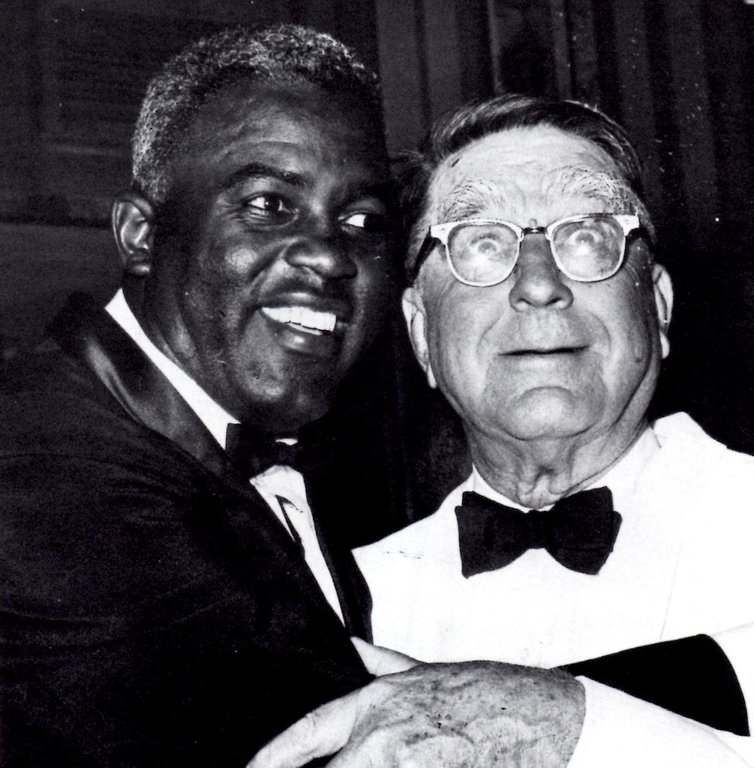
The photo was taken on July 20, 1962. The caption I found with it reads:
It was taken three days before Jackie was inducted into the Hall of Fame and seventeen years after they shocked the baseball world with the announcement that Jackie had signed to play for the Brooklyn Dodgers farm team in Montreal.
And, as we all know, the baseball world at the time was in desperate need of major “shock treatment!”…
Gary Livacari
Subscribe to our website, “Baseball History Comes Alive!” with over 1200 fully categorized baseball essays and photo galleries, now surpassing the 700K hits mark at 734K hits: www.baseballhistorycomesalive.com
Information: Excerpts edited from Branch Rickey Wikipedia page
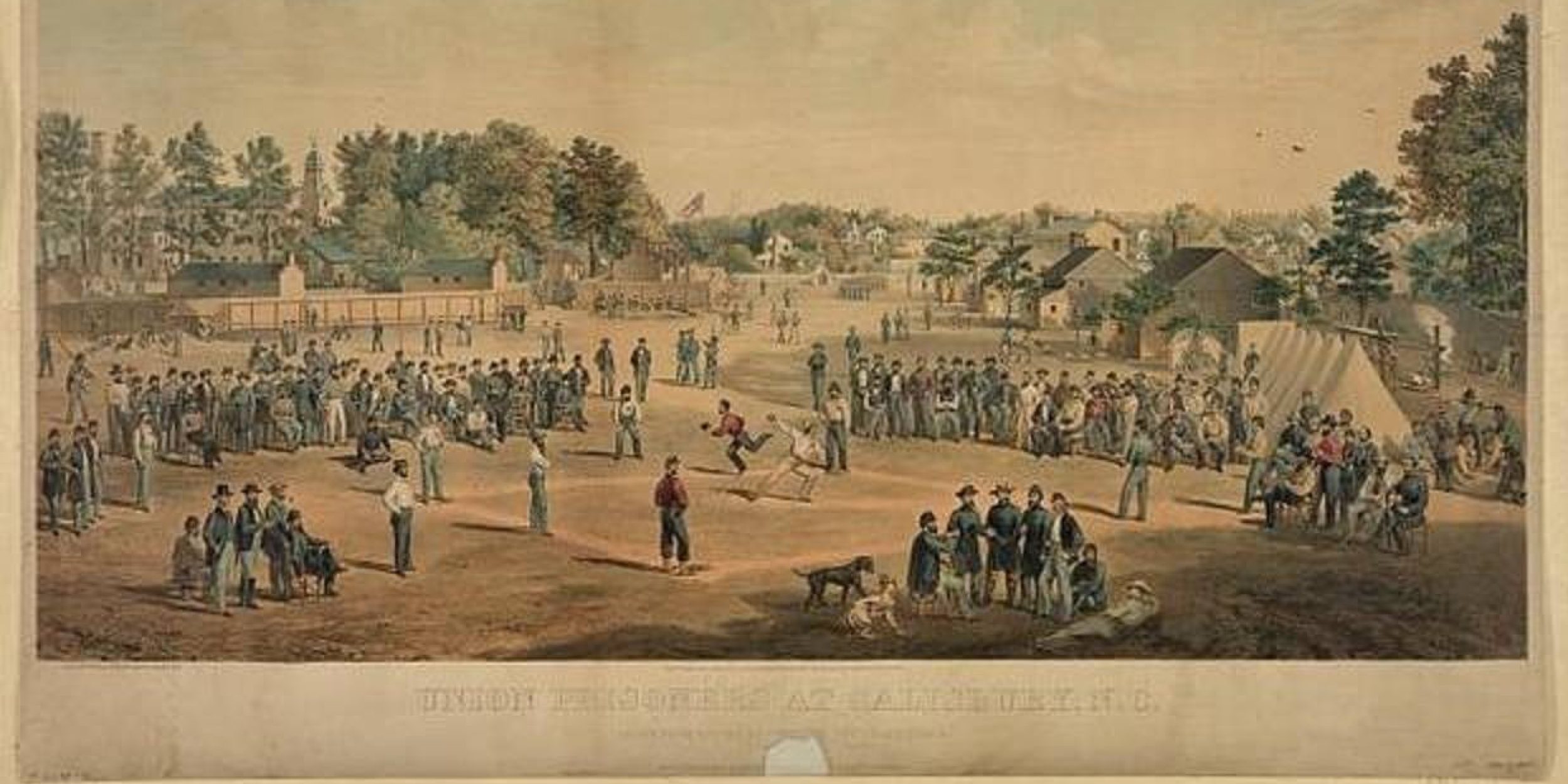
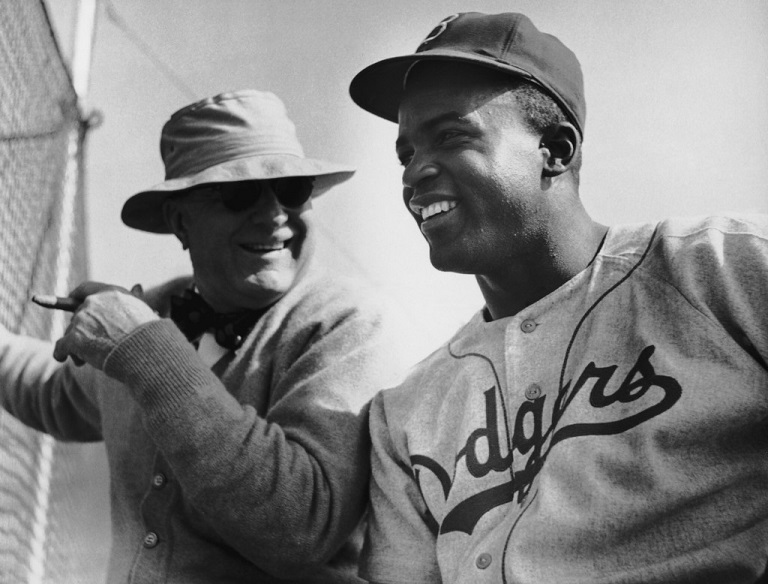
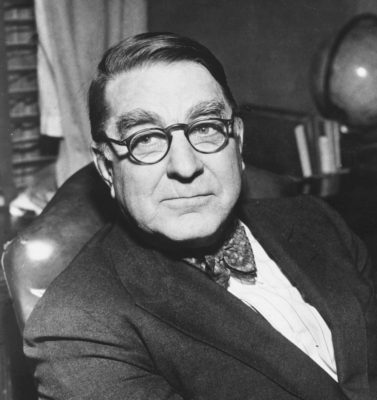
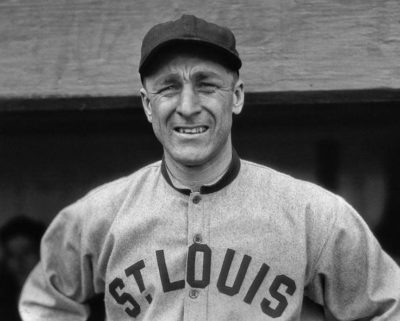
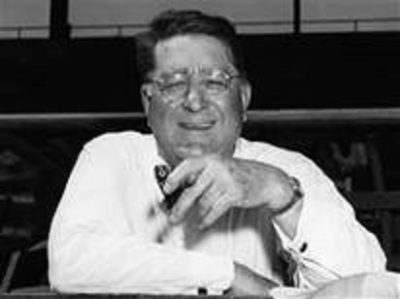
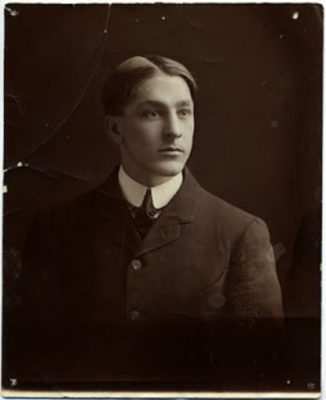
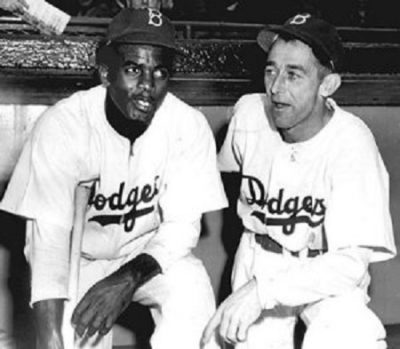
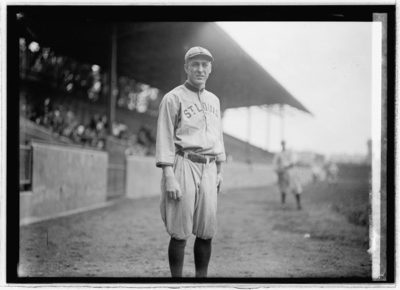
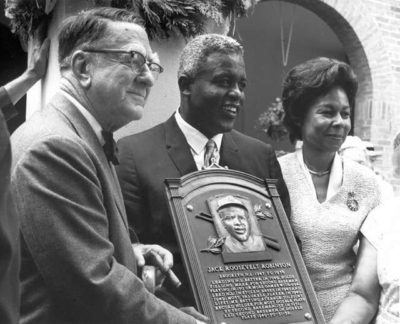
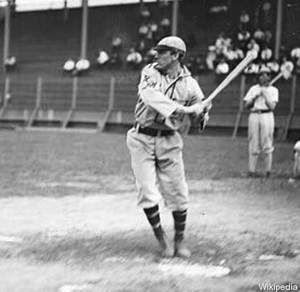
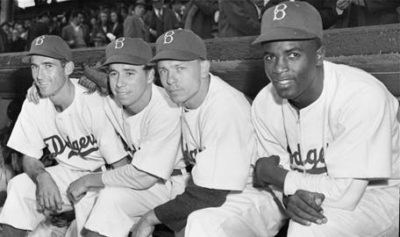
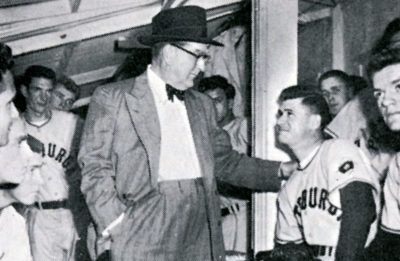
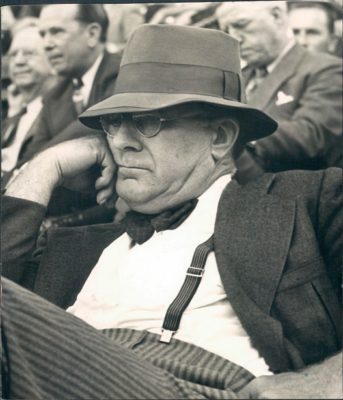
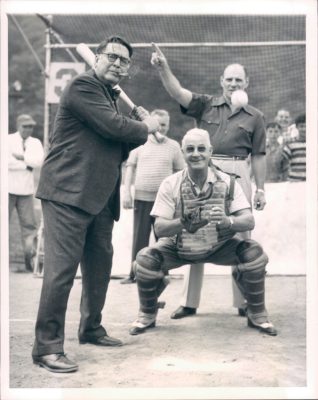
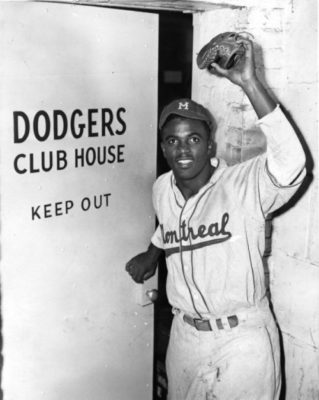
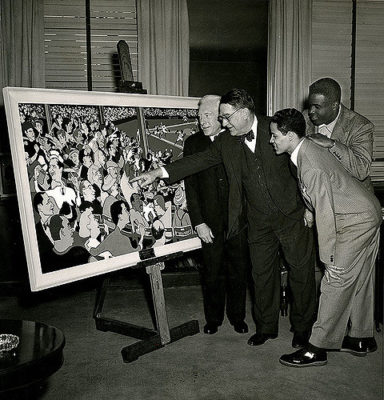
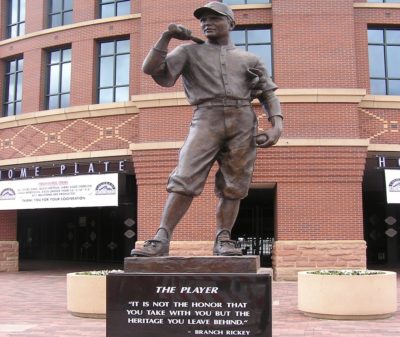
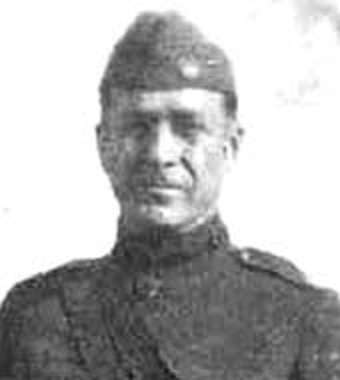
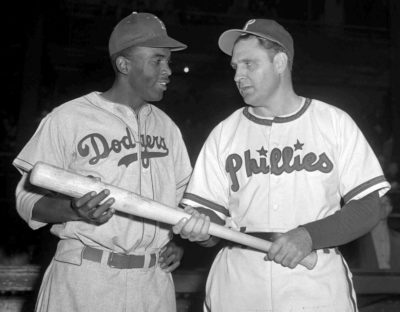
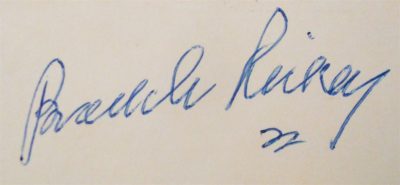
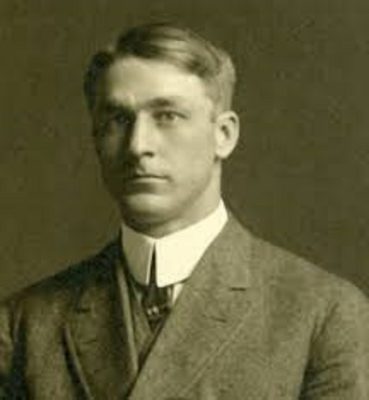
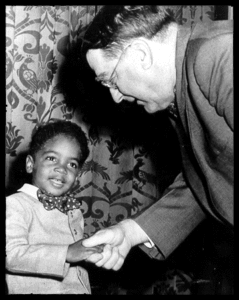
Its a shame Rickey sold his shares of the Brooklyn Dodgers to O’Malley. Rickey would have never moved the Dodgers out of Brooklyn.He thought it was “criminal” moving the team out of Brooklyn.
One of my favorite baseball quotes comes from Branch Rickey describing Leo Durocher. He once said (paraphrasing): “Leo Durocher has an uncanny ability to make a bad situation worse!”
Hi Guys:
I think I’ve posted before that I became a fan in 1947. I was 10 years old and sick in bed on a Sunday afternoon.In 1947 on a Sunday afternoon, there were not a lot of programming choices. You had religion, classical music, the news and baseball. Living in Brooklyn, NY, I was introduced to the Dodgers that day. Gil Hodges hit 2 home runs and became my instant favorite and hero.
. I had no idea I was witnessing anything historic that summer. Jackie Robinson was just another Dodger to me. I guess I was so busy learning the game, Ididn’t pay attention to other things going on. We didn’t gat our first tv until I was 12, so Jackie was a name on the radio, rather than the only black man on the field on television. I heard rather than watched him play baseball. Too, I was raised by parents who never made a prejudicial rremark about anyone in their home. I also grew up in a white neighborhood, so I never thought about race, it just wasn’t part of my life. It was only after watching him play himself in the movie “The Jackie Robinson Story” that I had any idea what he went through. I can only imagine how proud Branch Rickey was of his choice. God bless them both for having the grace and the guts to go through with it the way they did.
One more thing, it was Robert Moses who was responsible for the Dodgers leaving Brooklyn. Enlarging or replacing Ebbets Field wasn’t part of his building plan for Brooklyn. That master plan was the real villain of the piece.
As always, thanks for the memories.
Joan
Wonderful reflections, Joan. I also appreciate thepersonal stories like this. Makes it so meaningful. Thanks, Gary
Well said, Joan. And we have something in common. We both got television sets at the age of 12. But I saw Robinson in ’47, courtesy of neighbors who had TV’s already.
He was courageous and the greatest competitor I ever saw-he’d drive opposing pitchers nuts with his antics on the bases. And his heroics against the Phillies in the final regular season game of ’51 insured the Dodgers would meet the Giants in that famous playoff series.
Unfortunately, after Jack turned the other cheek during his first two years, he tended to overcompensate and incurred the wrath of many in the National League. Bobby Thomson indicated as much when I had the opportunity to interview him in 1966.
One kind of humorous scene occurred during the ’64 Republican convention when Jackie was escorted out of the hall, ranting vociferously about Barry Goldwater. He was off base on that one. But, as always, was very passionate in his beliefs.
He’ll always be remembered, along with Branch Rickey, as righting possibly the greatest wrong in the history of the country.
Classic story, Gary, about Rickey and Charley Thomas. Wow!
Thanks for such an appropriate, well written essay.
Best, Bill
Thanks Bill!
Always enjoy your photos, Gary. Thanks for giving us this product.